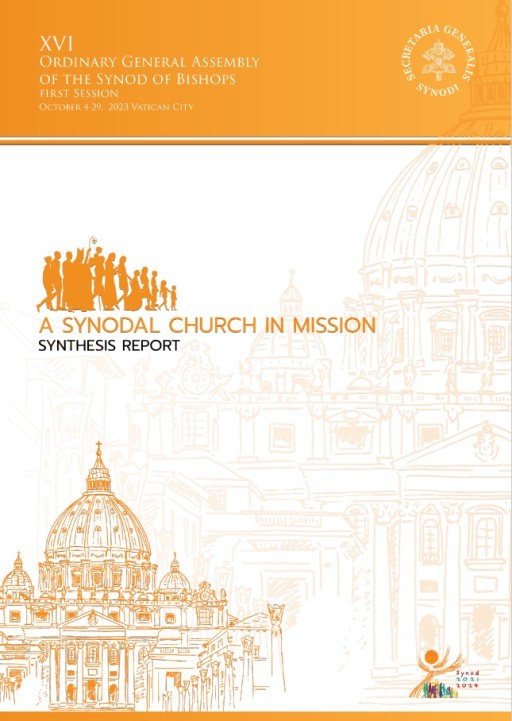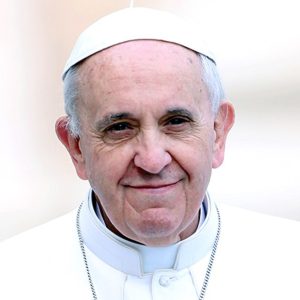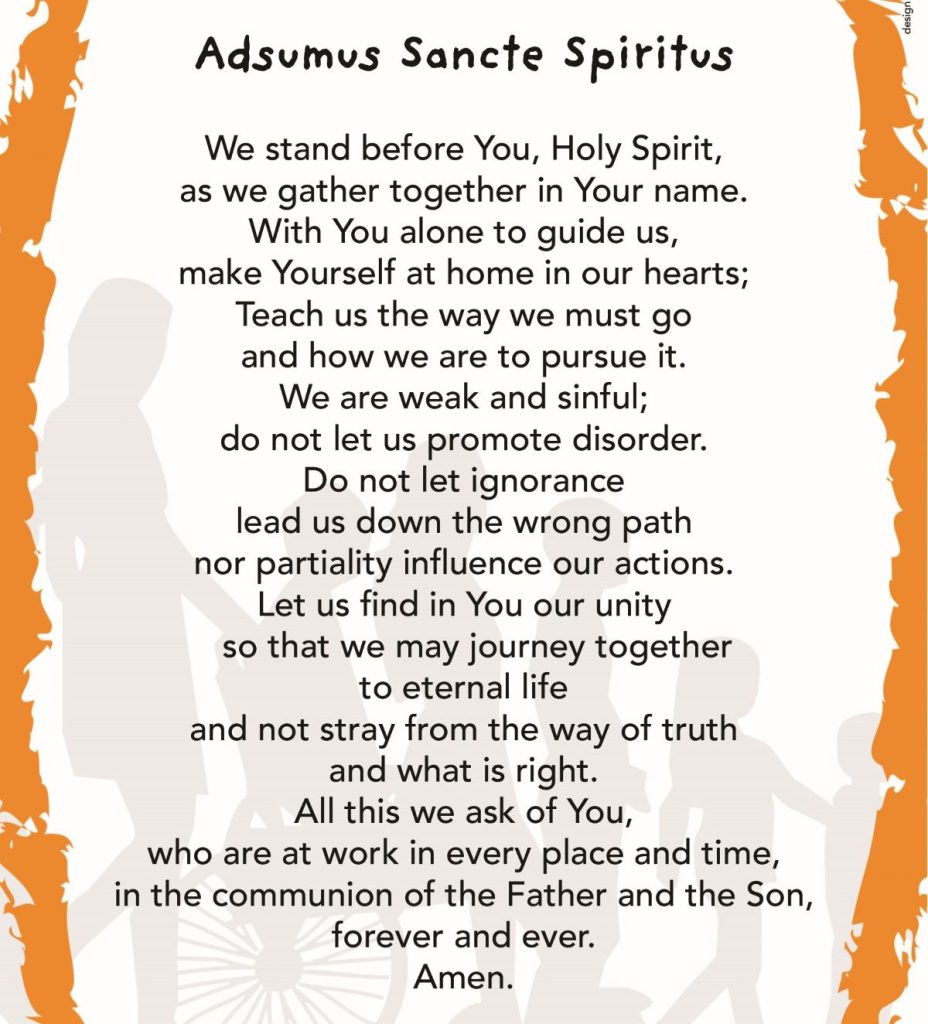From the Cardinal: Gathered and sent by the Trinity | February 16, 2024
Click a button to jump to the section:

Vol. 5. No. 11
According to the teaching of the Second Vatican Council, the Church is “a people brought together by virtue of the unity of the Father, the Son and the Holy Spirit” (LG 4). The Father, through the mission of the Son and the gift of the Spirit, involves us in a dynamism of communion and mission that moves us from the “I” to the “we” and places us at the service of the world (Synod Synthesis Report)
My Dear Sisters and Brothers in Christ,
In the four gospels, we see repeatedly that the disciples of Jesus are gathered together to experience communion with the Lord and with each other. Then, once they have been conformed to Jesus, their Master, they are sent out to the world to preach, to heal, to cast out demons, and, ultimately, to transform the world. The Second Vatican Council (Lumen Gentium) teaches that this dynamic of gathering and being sent is the work of the Blessed Trinity.
Synodality is an expression of this dynamism of gathering and being sent (communion and mission). As noted in the Synthesis Report for the October 2023 session, Synodality: A Synodal Church in Mission (see selection below):
Synodality translates the Trinitarian dynamism with which God comes to meet humanity into spiritual attitudes and ecclesial processes. For this to happen, it is necessary for all the baptized to commit themselves to the reciprocal exercise of their vocation, charism, and ministry. Only in this way can the Church truly become a “conversation” (cf. Ecclesiam suam 67) within itself and with the world, walking side by side with every human being in the style of Jesus.
In order to be of service to others, we must first encounter Jesus and become more deeply united with him and with each other. This experience of authentic communion moves us from the isolation of egoism (the “I”) to the fellowship of union with God and others (the “we”).
“By calling us to participate in His Body and Blood, the Lord forms us into one body, with one another and with Himself,” the Synod’s Synthesis Report reminds us. Holy Communion makes us one with Christ and in Christ. It gathers us together as the members of Christ’s Body, the Church, and it prepares us for being sent on mission to the world.
St. Augustine writes that in receiving the Eucharist we become what we receive (communion). He then admonishes us to share this most precious gift of intimate union with our Lord with all our sisters and brothers (mission). We are gathered in Love and then sent to be Love for others.
Pope Francis expresses it this way: “In virtue of their baptism, all the members of the people of God have become missionary disciples. All the baptized, whatever their position in the Church or their level of instruction in the faith, are agents of evangelization…” (Evangelii Gaudium, 120). We are all missionary disciples of our Lord and Savior Jesus Christ.
A disciple is one who, at least figuratively, sits at the feet of the Master. Disciples are learners; they receive wisdom in dialogue with their teacher and fellow disciples in order to grow as persons and as practitioners of their Master’s ways. A missionary, on the other hand, is one who leaves the comforts of home and ventures forth into unknown and often unfriendly territory in order to preach the Good News to those who have not yet heard or embraced it.
As missionary disciples, we are challenged to be both receivers and sharers. We are called to both deep, personal communion with Christ and each other, and to a bold form of outreach toward those who are—often without realizing it—eager to hear his voice and be comforted by his healing power.
Pope Francis counsels us that being a missionary disciple “means being constantly ready to bring the love of Jesus to others.” This can happen unexpectedly and in any place, the Holy Father says, “on the street, in a city square, during work, on a journey.” The first step is to allow Jesus to gather us, to bring us closer to himself and others. Then, once we have been filled with the gifts of Life and Love given to us by the Holy Trinity, we will be empowered by the grace of God to “walk side by side with every human being in the style of Jesus.” This profound dynamism of communion and mission is what Synodality hopes to accomplish as we all recognize our baptismal responsibility to be a Church gathered and sent in Jesus’ name.
Sincerely yours in Christ the Redeemer,
Cardinal Joseph W. Tobin, C.Ss.R.
Archbishop of Newark

A Lenten Message from Cardinal Tobin | 2024
What does Lent mean today? Is it just about giving up something you love, such as sweets or social media, or taking up something extra, like helping out more at home or a food pantry?
Pope Francis reminds us that Lent is far more than mere abstinence. It’s an invitation to embark on a journey of personal and communal renewal, guiding us toward the profound mystery of Jesus Christ’s death and resurrection. This sacred season beckons us into a synodal experience, calling the entire Church to prayerful contemplation and discernment of God’s will.
Our Catholic faith provides us with this unique penitential season to prepare us for the joy of Easter.
On Ash Wednesday, as we receive ashes, the Church echoes the words of St. Paul found in Corinthians: “Now is a very acceptable time; behold, now is the day of salvation.”
Ash Wednesday is significant because it begins our Lenten journey with a hint of where we are going and what we need to walk there. Faith is not instant tapioca; it needs time to mature and deepen. That is why we have 40 days to listen each day to the Word of God, to try to reconnect ourselves with God through the sacrament of reconciliation and daily prayer, to reconnect with our brothers and sisters, especially those who don’t look or act like us – recognizing that we’re called to love them as well; and finally, to reconnect with ourselves, to glimpse what God sees us and not simply what stares back at us in the mirror.
A deeper relationship with God isn’t a distant promise; it’s a present possibility. Our love for God and God’s People deepens each day as we journey together towards the celebration of the mystery of our Redeemer’s suffering, death, and resurrection.
In reclaiming our synodal identity as a Church, we recognize ourselves as a community journeying together in the footsteps of Jesus Christ, guided by the Holy Spirit. Through the disciplines of prayer, fasting, and almsgiving, we expand our communion with God and commit ourselves anew to living not for ourselves but for others.
Synodality isn’t merely a Lenten virtue but a fundamental way of being Church as well as a pathway leading us to the joy of Easter. Pope Francis likes to say that no one is saved alone. Salvation is not simply an individual pursuit; it’s a communal journey. We walk side by side, listening and learning from one another, sharing each other’s burdens and rejoicing in the hope of what lies ahead.
Let us embrace this Lent as a time to recognize and affirm our synodal identity as people guided by the Holy Spirit. Let us earnestly seek the gifts of the Spirit and strengthen ourselves for the journey towards Easter joy.
“Now is the day of salvation.” May our daily observance of Lent sustain us to walk the road ahead as a united and sanctified people of God.
I wish everyone in the Archdiocese of Newark and beyond “happy travels.” Let’s walk together.

A Synodal Church in Mission: Synthesis Report
A Selection from the Synthesis Report’s Part I: The Face of the Synodal Church, #2 Gathered and Sent by the Trinity
The celebration of the Eucharist, especially on Sunday, is the first and fundamental form by which the Holy People of God gather and meet. When this is not possible, the community although desiring the Eucharist gathers to celebrate a Liturgy of the Word. In the Eucharist, we celebrate a mystery of grace which is given to us.
By calling us to participate in his Body and Blood, the Lord forms us into one body, with one another and with Himself. Beginning with Paul’s use of the term koinonia (cf. 1 Cor. 10:16-17), the Christian tradition has treasured the word “communion” to indicate at the same time full participation in the Eucharist, and the nature of relationships among the faithful and among the Churches.
While it opens us to the contemplation of the divine life, to the unfathomable depths of the Trinitarian mystery, this term also refers to the ‘everydayness’ of our relationships: in the simplest gestures by which we open ourselves to one another the breath of the Spirit genuinely breathes. This is why communion, which springs from the Eucharist and is celebrated in it, configures and directs the paths of synodality.
From the Eucharist we learn to articulate unity and diversity: unity of the Church and multiplicity of Christian communities; unity of the sacramental mystery and variety of liturgical traditions; unity of celebration and diversity of vocations, charisms and ministries. Nothing shows more than the Eucharist that the harmony created by the Spirit is not uniformity and that every ecclesial gift is intended for common edification.
If the Eucharist shapes synodality, then the first step we should take is to celebrate the Mass in a way that befits the gift, with an authentic sense of friendship in Christ. Liturgy celebrated with authenticity is the first and fundamental school of discipleship. Its beauty and simplicity should form us prior to any other organized formation program.
A second step refers to the widely reported need to make liturgical language more accessible to the faithful and more embodied in the diversity of cultures. Without calling continuity with tradition and the need for better liturgical formation into question, deeper reflection is needed. Episcopal Conferences should be entrusted with a wider responsibility in this regard, according to the Motu Proprio Magnum principium.
A third step consists in the pastoral commitment to widen community prayer beyond the celebration of Mass. Alternative forms of liturgical prayer, as well as practices of popular piety, in which the distinctiveness of local cultures is reflected, are elements of great importance in fostering the involvement of all the faithful. They introduce the faithful to the Christian mystery and bring those less familiar with the Church closer to an encounter with the Lord. Among the forms of popular piety, Marian devotion stands out because of its ability to sustain and nourish the faith of many.

A Message from Pope Francis: Words of Challenge and Hope
A selection from the Apostolic Exhortation Evangelii Gaudium (The Joy of the Gospel), 127–129.
Today, as the Church seeks to experience a profound missionary renewal, there is a kind of preaching which falls to each of us as a daily responsibility. It has to do with bringing the Gospel to the people we meet, whether they be our neighbors or complete strangers. This is the informal preaching which takes place in the middle of a conversation, something along the lines of what a missionary does when visiting a home. Being a disciple means being constantly ready to bring the love of Jesus to others, and this can happen unexpectedly and in any place: on the street, in a city square, during work, on a journey.
In this preaching, which is always respectful and gentle, the first step is personal dialogue, when the other person speaks and shares his or her joys, hopes and concerns for loved ones, or so many other heartfelt needs. Only afterwards is it possible to bring up God’s word, perhaps by reading a Bible verse or relating a story, but always keeping in mind the fundamental message: the personal love of God who became man, who gave himself up for us, who is living and who offers us his salvation and his friendship. This message has to be shared humbly as a testimony on the part of one who is always willing to learn, in the awareness that the message is so rich and so deep that it always exceeds our grasp. At times, the message can be presented directly, at times by way of a personal witness or gesture, or in a way which the Holy Spirit may suggest in that particular situation. If it seems prudent and if the circumstances are right, this fraternal and missionary encounter could end with a brief prayer related to the concerns which the person may have expressed. In this way they will have an experience of being listened to and understood; they will know that their particular situation has been placed before God, and that God’s word really speaks to their lives.
We should not think, however, that the Gospel message must always be communicated by fixed formulations learned by heart or by specific words which express an absolutely invariable content. This communication takes place in so many different ways that it would be impossible to describe or catalogue them all, and God’s people, with all their many gestures and signs, are its collective subject. If the Gospel is embedded in a culture, the message is no longer transmitted solely from person to person. In countries where Christianity is a minority, then, along with encouraging each of the baptized to proclaim the Gospel, particular Churches should actively promote at least preliminary forms of inculturation. The ultimate aim should be that the Gospel, as preached in categories proper to each culture, will create a new synthesis with that particular culture.
Source: Vatican

My Prayer for You
Please join me in praying this Prayer for the Synod, Adsumus Sancte Spiritus:
We stand before you, Holy Spirit,
As we gather together in your name.
With you alone to guide us,
Make yourself at home in our hearts;
Teach us the way we must go
And how we are to pursue it.
We are weak and sinful;
Do not let us promote disorder.
Do not let ignorance
Lead us down the wrong path
Nor partiality influence our actions.
Let us find in you our unity
So that we may journey together
To eternal life
And not stray from the way of truth
And what is right.
All this we ask of you
Who are at work in every place and time,
In the communion of the Father and Son,
Forever and ever. Amen
